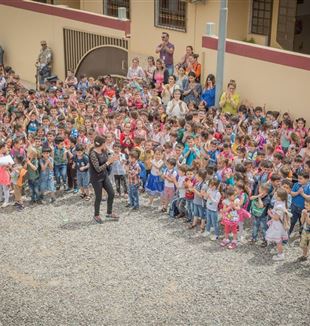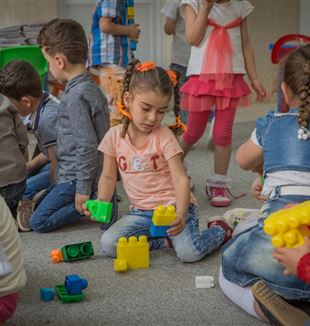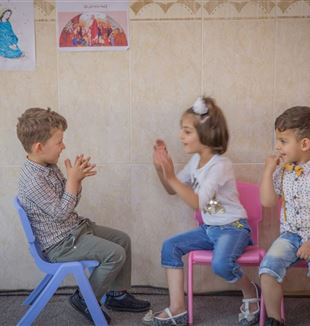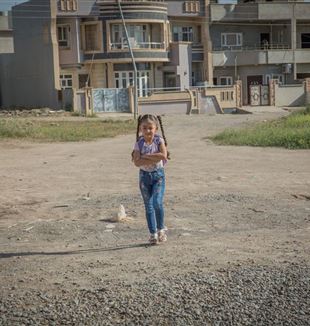
AVSI: Samia’s exercise books
Distance support for 450 Iraqi children. A project of the Italian NGO that started in 2015 to help a people return to living after the Isis occupation.Samia is a 12-year-old Azyda girl who lives in Duhok, a town in Iraqi Kurdistan, north of Mosul, where she participates in AVSI's Distance Support projects. "She was only two years old when Isis captured her and her entire family," explains Emanuela Girardi, a project manager based in Erbil. "She was left with her mother, grandmother, two brothers and two sisters, one of whom had been sold to an Isis militant, who held her captive for two years. The Islamic State had entrusted Samia to an affiliated family in Mosul. The child was later freed following a ransom and was able to return. Her father, four brothers and three sisters remain missing to this day. "When Samia was reunited with her family in 2018, she did not recognize anyone, because she was very small when she was taken away. We accompanied her step by step in the process of readjusting to her new life. She is now happy and is going to school with her new friends."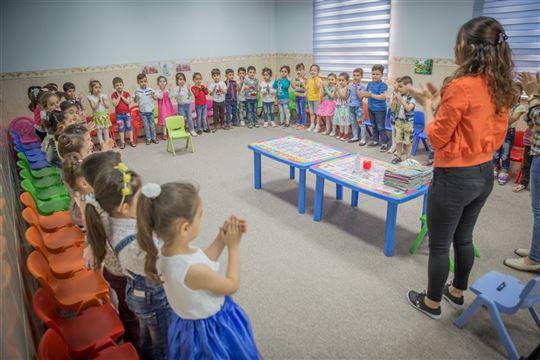
Hers is one of the many stories of the 450 Iraqi children, aged between 4 and 14, who receive aid from AVSI, made possible by the Distance Support projects. "Our projects began in 2015 in response to the Isis occupation," explains Lorenzo Ossoli, AVSI manager in the country. "The first objective was to support displaced children and their Christian families from Qaraqosh, guaranteeing them food and education. In particular, we supported the kindergarten and primary school that the Dominican sisters had opened in the Erbil refugee camp.” In 2018, when the families decided to return to Qaraqosh, Ossoli continues, AVSI continued to accompany them by providing educational, nutritional and medical support. "In 2021, we extended the Distance Support project to the Duhok area to support the Yazidi community. The Yazidis are the ethnic group most affected by the Islamic State. Even today there are 3,000 kidnapped women and girls still in the hands of terrorists.”
For both the Christian children in Qaraqosh and the Yazidis in Duhok, it is first and foremost a matter of procuring the materials to enable them to attend school: pencils, exercise books, markers. But the greatest job is to organize moments of study aid, recreational initiatives such as art therapy, with a strong, as they say in their somewhat aseptic slang, 'psychosocial' component. Listening to Samia's life story, however, it is easy to understand what she means. All the children have had at least one relative killed. Some have had eight, nine. These are inner wounds that are difficult to identify with. And it is utopian to think you can heal them. It is possible, however, to help children recover a balance that allows them to move on. This is a challenge that is not only to do with the Islamic State's war, but the Christian community in Qaraqosh has also been affected by a more recent tragedy. “On September 27, a fire broke out in a reception hall during a wedding party,” Emanuela recounts: “There were about a thousand guests present. 107 people were killed and 82 injured. One of the victims was a little girl who was participating in our projects.” More mourning. On a wounded and hypersensitive social body. Ossoli explains: “Official investigations have established that it was an accident and that the flames developed following the lighting of small fireworks. But some people do not want to believe this reconstruction and think that there was arson.”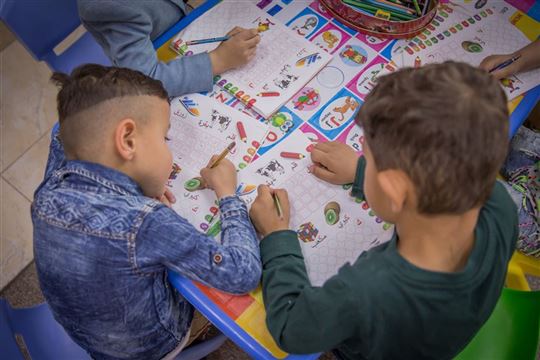
After the mass exodus in 2014, it was difficult for Christians to return to their lands and start life anew. For many it was not possible and they left the country. Others left for economic reasons, others for a sense of insecurity and because those places were linked to personal traumas, impossible to forget. There are those who, on the other hand, managed to restart their businesses: artisans and shopkeepers, above all.
INFO - The AVSI website
For the Yazidis, however, the situation is even more complicated. In the region of Duhok, they are still refugees and, therefore, their situation is even more precarious from an economic point of view, with consequences for the families also in terms of food. This is why AVSI, in agreement with the local authorities, has organized work activities of public interest. "With their help, we have put a well back in operation, so as to guarantee one of the districts of the city access to water. Then last year, we resurfaced some roads, making them easier to walk on. And we installed solar lights for night lighting. This year we will do the same with those in another part of the town centre," explains Emanuela. Lorenzo continues: "On the one hand, it is a way to help families to have a small income, and on the other it is a signal that we give to the inhabitants of the city, to see the active contribution of refugees to the life of the place that hosts them. It is something that contributes to social cohesion.”
